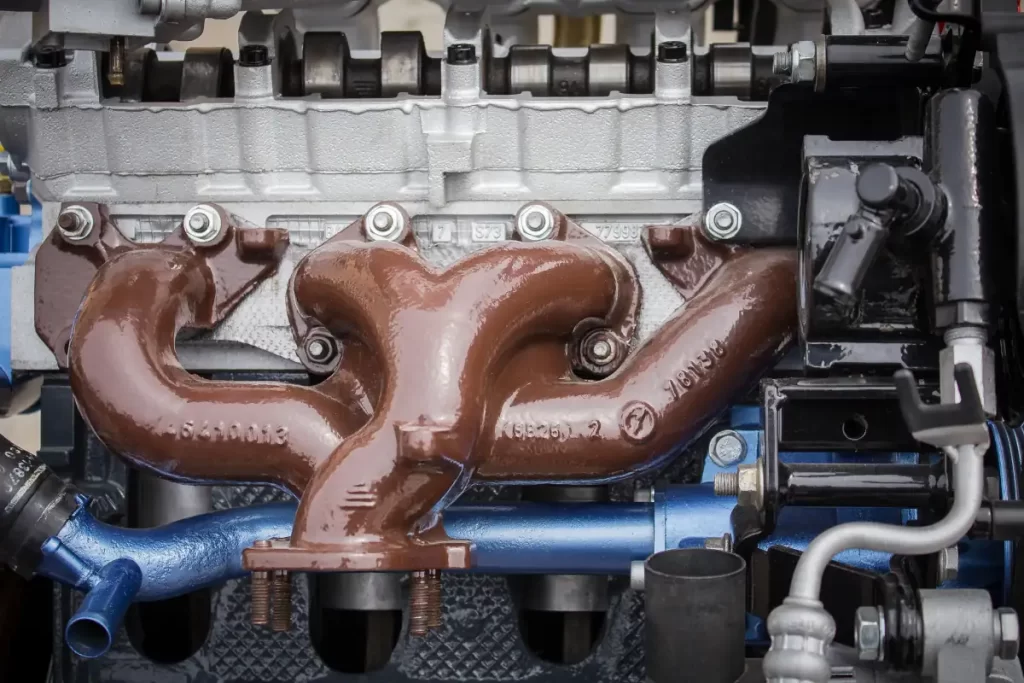Your car exhaust manifold is the front part of a car’s exhaust system. Mainly located directly to the engine block, it filters all the exhaust gases from all the components and transfers them to your vehicle’s catalytic converter.
So, any leak in the exhaust manifold usually causes gases to escape, which can be hazardous and trigger the engine light. In other scenarios, some car owners and drivers typically notice that their car exhaust manifold starts smoking, wondering what might be the problem.
If you are one of them, today, we shall take a deeper look at why your car exhaust manifold is smoking and explore ways to fix the problem, among other topics. So, with no further ado, let’s get started.
Here’s Why Your Car Exhaust Manifold is Smoking
It should alert you if you notice any thick white smoke from your car exhaust manifold. Take time to analyze where the fumes are coming from and if they are normal. Your car exhaust manifold might be smoking because of a cracked or damaged engine block, bad fuel injector, condensation build-up, destroyed coolant reservoir tank, and many other reasons.

Let’s narrow down and look at each reason.
1. Condensation Build-up
Sometimes when you see thin white smoke from your car exhaust manifold, the smoke will disappear because of condensation build-up around the exhaust system. Most of the time, this happens during the winter season and on freezing mornings.
The smoke is thin, not visible but coming out in small quantities. It usually disappears when you warm up your engine after 30 seconds or a minute. It is not a huge problem, but if it happens together with other occurrences, it may cause severe problems to your engine.
2. Coolant Spill or Damaged Coolant Reservoir Tank
Check your coolant reservoir tank. And if it’s cracked or damaged, it may spill coolant into your engine’s combustion chamber. The spilled coolant usually burns inside the cylinders making your car exhaust manifold smoke.
Though it rarely happens, the coolant reservoir tank can get cracked or damaged when you solve another problem in your car and accidentally damage it. If it’s destroyed, you will have to replace the tank.
3. Damaged or Cracked Cylinder Head
Cracks in the cylinder head are usually a result of consistently overheating your engine because of low coolant amounts.
If your cylinder head is cracked, it will force the coolant to leak and combine with the engine oil. When this takes place, it will contaminate the engine oil, which will, in turn, make your car exhaust manifold smoke.
You must always be cautious because even a tiny crack will create huge bursts of white smoke on your exhaust manifold.
4. Damaged Head Gasket
Primarily located between the engine block and cylinder head, the head gasket helps to form a seal between these two parts and prevents any coolant leaks from getting inside the engine.
The head gasket can get cracks because of just wear and tear. Because of the damages, the coolant will flow to the cylinder, where it will be burned, resulting in your car exhaust manifold smoking.
If your head gasket is damaged or cracked, you must replace it immediately. You cannot repair it.
5. Cracked Engine Block
It is usually really worst when the entire engine block has a crack. And that can be tedious and expensive for you when doing the replacement. You will have to hire a professional to do the repairs and replacement.
Manufacturers usually put in a lot of effort when making engine blocks. They use either aluminum or alloy for the blocks to last longer. However, the entire engine component requires each of the other car’s systems to work in perfect harmony for optimum performance.
If even one component fails to perform, your block will overheat, weaken, and deteriorate. That’s why you will see your car exhaust manifold smoking.
Poor Fuel Injector
The fuel injector is a spray nozzle that transmits fuel to the combustion chamber as input for the combustions. For best operation inside the engine chamber, the injector must spray fuel at crucial moments, implying that any slightest difference can make the entire system out of balance.
When you notice your fuel injector malfunctioning or leaking, your chamber will only get the appropriate fuel at a suitable time. And when there is excess fuel in your engine, it has to burn and be expelled, causing white smoke to come out of the exhaust manifold.
It is not recommended that you change the injector by yourself. Get a professional mechanic to help you out.
Engine Control Component Error
Check if your engine control unit is glitchy or faulty, making it throw off the duration of the fuel injector. At some point, you will have to repair or replace the engine control unit for it to get the correct timing of your fuel injector pump.
Oil Leak
You will find oil leaks if your valve seals or piston rings are leaky, making oil flow to within. The impact of oil leakage is that your engine components will not get enough oil lubrication, making your car exhaust manifold smoke.
Related:
- Are ATP Exhaust Manifolds Good? (Explained For Beginners)
- Is A Car Exhaust Manifold Heat Shield Necessary? (3 Signs Of Damage)
- Are Car Exhaust Manifold Gaskets Reusable? (Explained For Beginners)
Is Smoke Coming Out of the Exhaust Manifold Bad for the Car?
Sometimes the smoke can mean nothing to your car, but if it is thick and white, that should alert you. Take a keen look at your engine compartment and understand where the smoke comes from.
Under normal conditions, it’s not good to see smoke coming out of the exhaust manifold, but in winter or colder seasons, you can notice a thin veil of smoke and white vapor.
Once you run your engine for some minutes, it will dry off. However, you must thoroughly inspect other parts to eliminate any possible causes.
Any other smoke from the car exhaust manifold can damage your engine compartments and even lead to malfunctioning and damage when left out for extended periods.
Can I Drive my Car with the Exhaust Manifold Smoking?
It all depends on the source of the smoke. If it is because your car has overheated, then driving it may damage the engine. If the smoke originates from engine oil spilling, it may lead to an engine fire while traveling.
Exhaust manifold smoking is serious, so make sure you know why it’s fuming before you can drive your vehicle. Have a professional mechanic check, diagnose and repair anything that is causing the smoke for you to have a comfortable ride.
How Do I Fix the Car Exhaust Manifold Smoking?
Here are various ways to fix the car exhaust manifold smoking. Take a look.
1. Inspect the Coolant Level
Inspect the coolant level; if you see the amount is too low, and there is no leaking, the smoke can be due to a head gasket, engine block, or cylinder head damage.
A coolant that is adequate and is not leaking means it is not the cause. You can proceed to examine other engine components.
2. Check Out for any Cracks or Damages in the Intake Manifold Gasket
Examine the intake manifold gasket, which usually seals the entire manifold. Your gasket typically comprises plastic or rubber and therefore is suspectable to damage. So, if it has cracks, you can hire a mechanic to repair and replace it in case of any damage.
You will spend $190 to $540 to replace your intake manifold basket.
To get a gasket alone, you will spend around $20 to $120, which is cheap. The expensive thing is usually labor because the replacement job is more challenging.
3. Replace the Fuel Injector
If you notice your fuel injectors are clogged and not functioning appropriately, you will have to replace them so that you can rule out that they are the possible cause of car exhaust manifold smoking.
You must replace all sets of fuel injectors, not just the cracked or damaged ones, so the engine can operate evenly.
4. Change the Fuel Pump
If the cause of the smoking is due to the timing of the injector pump, you will have to reprogram your car computer. If the problem persists, the best option is to replace the pump altogether. You will spend around $220 to $1100 to replace the fuel pump.
For labor, the cost is around $120 and $260, respectively. You will have to hire a mechanic for the replacement since the process requires knowledge and tools.
After you are done with the replacement, ensure you minimize fuel injector pump damage because of contaminants in the diesel. Always try to replace your diesel fuel filter routinely and get good quality diesel at outstanding refill stations.
5. Check Piston Rings or Valve Seals
They are usually susceptible to wear and tear. So, anytime they are damaged, replacement is the only option. Unfortunately, replacing valve seals or piston rings is quite expensive, and even labor takes a pretty good time.
Changing the valve seals usually includes disassembling the engine until you spot the valve spring. This implies that you will need the help of a certified mechanic to help you out with the process.
6. Repair Any Cracks in the Engine Block
There are three ways to repair your cracked engine block: A cold-metal patch above the crack, re-welding the crack, or using cold-metal stitching it shut. You can consider the help of an expert to help you with any of these ways.
No matter the type of method you will want to use, you will incur some costs from labor to materials. The repair only lasts 12 to 35 hours, depending on the model and make of your car. You will spend around $2500 to $4000 for just a temporary fix.
If the engine block is damaged, you will pay between $600 to $1000 for little small-block engines and $1500 to $2500 for the case of long-block machines. Don’t be afraid to spend more because, at the end of it all, you can save your engine and other parts, and your car exhaust manifold will return to its perfect shape.
How Much Does It Cost to Fix a Car Exhaust Manifold Smoking?
The cost of fixing your car exhaust manifold usually varies from one mechanic to another. At some point, you will spend more if the damage is severe. In the case of replacements, you will incur even much more since disassembling everything and the required knowledge is usually time-consuming.
You will pay more, but you will save your car’s components and enhance your vehicle’s performance.
Conclusion
Today, we hope you have learned why your car exhaust manifold is smoking. Pay attention to any smoke coming out of your manifold since, if left out, it may affect the performance of other parts of your vehicle.
If it’s not vapor caused by outside temperatures like during winter or cold mornings, then you should have your car exhaust manifold inspected by a certified car mechanic.
Always remember to take good care of your car exhaust and carry out regular maintenance for it to be in perfect shape to improve your car’s general performance.
Sources
White Smoke from Exhaust: Reasons and How to Fix it



